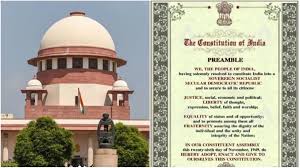Petitions seeking removal of the words secularism and socialism from the Constitution rejected, Supreme Court’s decision

The Supreme Court has dismissed the petitions demanding the removal of the words secularism and socialism from the Constitution. These petitions were filed by former Rajya Sabha MP Subramanian Swamy, advocate Vishnu Shankar Jain and others. It is worth noting that words like secularism and socialism were added under the Constitution Amendment passed in 1976. Last Friday, the Supreme Court had reserved its decision. Rejecting the petition, the Chief Justice said that ‘there is no need to hear this petition in detail.’ The CJI said that ‘words like socialism and secularism were added through the Constitution Amendment in 1976 and they do not make any difference to the Constitution adopted in 1949.’
These words were added during the Indira Gandhi government
Let us tell you that in 1976, the Indira Gandhi government had included the words ‘socialist’, ‘secular’ and ‘integrity’ in the Preamble of the Constitution by making the 42nd Constitutional Amendment. After this amendment, the character of India in the preamble was changed from ‘sovereign, democratic republic’ to ‘sovereign, socialist, secular, democratic republic’. Arguing during the hearing, petitioner advocate Vishnu Kumar Jain cited a recent decision of a nine-judge Constitution Bench. Referring to the decision of the 9-judge bench on Article 39 (B) of the Constitution, he said that in that decision, the apex court disagreed with the interpretation of the word “socialist” which was propounded by former apex court judges Justice VR Krishna Iyer and O Chinnappa Reddy.
The Supreme Court had defended the amendment
On this, CJI Khanna said that in the Indian context we understand that socialism in India is very different from other countries. We understand socialism to mean mainly a welfare state. In a welfare state, it should stand for the welfare of the people and provide equality of opportunities. He said the apex court had held “secularism” as part of the basic structure of the Constitution in the 1994 SR Bommai case. Advocate Jain further argued that the 1976 amendment to the Constitution was passed without hearing the people as it was passed during the Emergency. Inclusion of these words would mean forcing people to follow specific ideologies. He said when the preamble comes with a cut-off date, how can new words be added to it? The bench said Article 368 of the Constitution gives Parliament the power to amend the Constitution and the preamble also comes under its extension.




